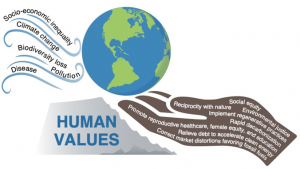The urgent need to align political will, economic resources and societal values to ensure a more sustainable and equitable world is the focus of a study by an international team of scientists published in the Proceedings of the National Academy of Sciences NEXUS. Led by University of Hawaiʻi at Mānoa researchers, the review summarizes the grave threats facing the planet but rejects a "doom and gloom" philosophy. Instead, the authors argue, the threats should motivate swift and substantial actions.
"Climate change, ecological destruction, disease, pollution, and socio-economic inequality are pressing global challenges facing humanity in the 21st century," said Chip Fletcher, lead author and interim dean of the UH Mānoa School of Ocean and Earth Science and Technology (SOEST). "These crises are not isolated problems but are interwoven, exacerbate each other, and create amplifying feedbacks that pose a grave threat to both the environment and human well-being."
"Environmental and human health are inextricably linked," said David Karl, co-author and professor of oceanography at UH Mānoa. "Urgent and comprehensive action is called for, including rapid decarbonization, fostering a more harmonious relationship with nature, and equitable human development."

The authors argue that centuries of imperialism, extractive capitalism and population growth have pushed Earth's ecosystems beyond their limits, and created a broadening pattern of social inequality. Marine and terrestrial biomes face critical tipping points, while escalating challenges to food and water access foreshadow a bleak outlook for global security. The most vulnerable human populations, those who bear the least responsibility, disproportionately bear the consequences of these interwoven global crises.
Cross-disciplinary study
The 18 authors combine their expertise in Earth and ocean sciences, politics, law, public health, renewable energy, geography, communications and ethnic studies to assess causes, impacts and solutions to a multitude of worldwide crises.
"To avoid these consequences, we advocate a global cultural shift that elevates kinship with nature and communal well-being, underpinned by the recognition of Earth's finite resources and the interconnectedness of its inhabitants," said Krista Hiser, professor of English at Kapiʻolani Community College.
The authors welcome signs that humanity is interested in changing its value system to prioritize justice and reciprocity within human societies and between humans and natural landscapes and ecosystems, which they see as the best route to true sustainability.
The authors call for a global cultural shift in values, aided by education, robust policy, economic incentives, cross-sector partnerships, community empowerment, corporate accountability, technological innovation, leadership and cultural narratives delivered through art and media. They conclude that humanity must stop treating these issues as isolated challenges and establish a systemic response based on kinship with nature that recognizes Earth as our lifeboat in the cosmic sea of space.






